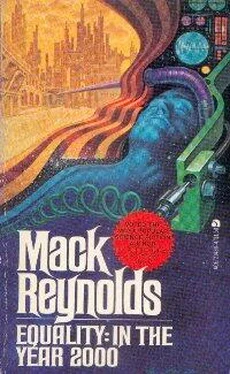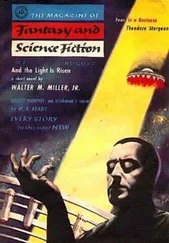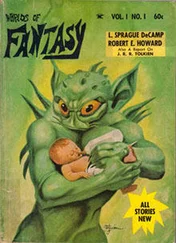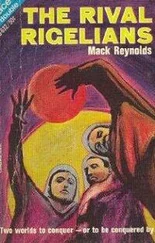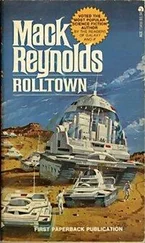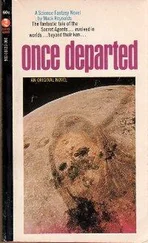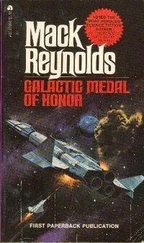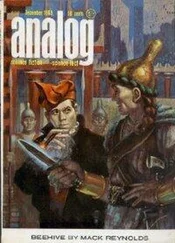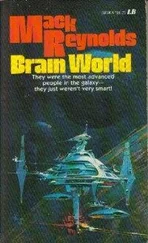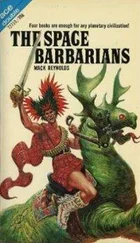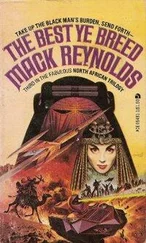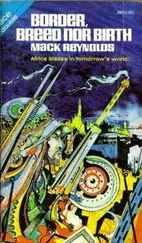Mack Reynolds - Equality - In the Year 2000
Здесь есть возможность читать онлайн «Mack Reynolds - Equality - In the Year 2000» весь текст электронной книги совершенно бесплатно (целиком полную версию без сокращений). В некоторых случаях можно слушать аудио, скачать через торрент в формате fb2 и присутствует краткое содержание. Год выпуска: 1977, ISBN: 1977, Издательство: Ace Books, Жанр: Фантастика и фэнтези, на английском языке. Описание произведения, (предисловие) а так же отзывы посетителей доступны на портале библиотеки ЛибКат.
- Название:Equality: In the Year 2000
- Автор:
- Издательство:Ace Books
- Жанр:
- Год:1977
- ISBN:0-441-21430-4
- Рейтинг книги:3 / 5. Голосов: 1
-
Избранное:Добавить в избранное
- Отзывы:
-
Ваша оценка:
- 60
- 1
- 2
- 3
- 4
- 5
Equality: In the Year 2000: краткое содержание, описание и аннотация
Предлагаем к чтению аннотацию, описание, краткое содержание или предисловие (зависит от того, что написал сам автор книги «Equality: In the Year 2000»). Если вы не нашли необходимую информацию о книге — напишите в комментариях, мы постараемся отыскать её.
Equality: In the Year 2000 — читать онлайн бесплатно полную книгу (весь текст) целиком
Ниже представлен текст книги, разбитый по страницам. Система сохранения места последней прочитанной страницы, позволяет с удобством читать онлайн бесплатно книгу «Equality: In the Year 2000», без необходимости каждый раз заново искать на чём Вы остановились. Поставьте закладку, и сможете в любой момент перейти на страницу, на которой закончили чтение.
Интервал:
Закладка:
Edith was incredulous. “You mean you bought a whole country?”
He said wearily, “That isn’t the way it works. It’s very complicated and, in fact, I don’t know how it works. I had people who worked for me who knew how it works. That’s how we all operated: Hughes, Getty, all of us. We could hire brains; we didn’t have to have any.”
She said, “I can’t believe this.”
“I gave you the wrong idea. I didn’t buy a country. Who in the hell wants a country? You’d have to worry about schools, hospitals, all the rest of it. What I bought was… well, control of everything that was worth owning in the country. The right to exploit it.” He added cynically, “Including the president and senate. Come to think of it, whether or not they were worth owning is moot.”
She regarded him coldly and said, “I think your actions were disgusting.”
He came to his feet.
“Yes, I know. Looking back on it, so do I.”
Chapter Thirteen
The Year 1949
The nightmare was not a new one. It was as vivid as any of the others, though not so upsetting as the war dreams.
The event which came back to him had taken place when he was about fifteen, a teenager. His parents had died in the racing crash only the year before, and his uncle, who had taken over the raising of the heir to the West Enterprises fortune, had suggested a world cruise to take his mind off the tragedy.
The luxury cruise ship had traveled east from New York, and the early weeks of the trip weren’t of particular interest to the young Julian. He had been to Europe many times, many times he had sailed in the Mediterranean. However, once they passed through the Suez Canal and entered the Red Sea, he was in new territory. From Aden, at that time as British as Gibraltar, they had taken off across the Arabian Sea for Bombay, their first Indian port.
He took one of the passenger launches from the ship to the harbor landing before the Gateway to India.
He sat in the bow looking at the harbor with its myriad strange-looking craft. He had never seen lateen sails before, let alone outriggers. The vessels were a study in contrasts, ranging from such ultra-modern ships as their own Scandinavian steamer, to Arab dhows. The guide who had accompanied them from the ship to show them the city, explained that the dhows sailed all the way from Africa, during the monsoon season, and had been doing so since before the days of the Roman Empire.
Julian was one of the first off the launch. As a result, he was the first to be accosted by the beggars. There were at least a dozen of them, barefoot, ragged, dirty; the women all had at least one child, usually naked. Julian winced, being a sensitive boy at this point in his life, but he hadn’t as yet changed any money and carried only traveller’s checks. He had never seem a grimier lot, all thin to the point of emaciation.
He made his way through them as best he could, by looking up at the massive edifice, the Gateway of India, a Victorian arch of stone. The guide was saying that it served as a place of reception on important ceremonial occasions.
Leaving the others, Julian made his way through the arch to the large square beyond. There were more beggars here, each more ragged and dirty than the last. He looked about and spotted what appeared to be a police officer: a tall, handsome man with a thick black beard which was gathered up in a little net, and a white turban. He was in uniform and carried a swagger stick. He wore an iron-handled knife at his belt and an iron bangle on his left wrist. Julian was to find out later that the man was a Sikh.
He approached and said, “I beg your pardon. Could you direct me to the Taj Mahal Hotel?”
The other touched his turban in an easygoing salute, and pointed. “That is the Taj, right over there, sir.”
It was only a few hundred yards away, and as Julian walked toward it he could see that it was a large building, undoubtedly built in the old Victorian days of the Empire. It reminded him of a Gothic British railway station. There were two turbaned men at the door. One of them opened it at Julian’s approach, bowing in servile fashion.
The reception hall beyond was as one might have expected from the exterior, and Julian could have been in one of the older London hotels had it not been for the fact that all of the employees wore white turbans and had very dark complexions.
He went to the desk, receiving another servile bow, and said, “I wish to see Edward Fitz-James.”
“Yes, sir. Sir Edward is not in his suite, sir. Only a few minutes ago I saw him ascend to the lounge on the second floor.” The clerk indicated a large, red-carpeted stairway.
“Thank you,” Julian said, evidently somewhat to the man’s surprise.
He ascended the stairs and found another turbaned Indian at its head. There seemed to be a multitude of employees in this hotel.
“Could you point out Edward Fitz-James to me, please?”
The other blinked at the please , bowed and said, “That is Sir Edward over there at the small table near the window, sahib .”
Sir Edward, yet. Julian hadn’t known the man he was seeking held a title. Fitz-James had once had business dealings with his father, and had become somewhat of a friend of the Wild Wests. Julian had been given an introduction by his uncle, who had evidently either written or cabled ahead, since Julian had received a radiogram arranging for a get-together.
Julian approached and asked politely, “Sir Edward Fitz-James?” The man who looked up at him stiffly was a stereotype of the bluff Britisher: possibly fifty-five, maybe thirty pounds overweight, too red in the face, with a toothbrush mustache. He wore white shorts to the knee, a white shirt, heavy walking shoes and white woolen socks almost up to the knee.
He stood up. “You must be Julian West, I wouldn’t wonder. Resemble your father a bit.” He put out a beefy hand to shake and said, “Do sit down, dear boy.”
“Thank you, sir,” Julian said, and took an overstuffed leather chair across from the Englishman.
Sir Edward said jovially, “I say, if you walked over from the gate, you must already be bloody hot. Terrible climate here, isn’t it? Do have a lime squash.”
Then Julian noticed that he had a tall glass before him, well frosted, which contained a slightly greenish beverage. He turned and snapped his fingers imperiously at the nearest Indian, who hurried over.
“Another lime squash,” Sir Edward commanded. “And put a move into it.”
“Yes, Sir Edward,” the man said and hurried away.
“Beggars are slow as turtles,” the Britisher commented in a voice loud enough to carry to the man and half the other waiters in the lounge. “You have to learn the drill here. Keep the niggers in their place, don’t you know?”
Julian couldn’t think of anything to say to that so he kept his peace. He found the other a bit on the overwhelming side.
“Read about your father and mother,” Sir Edward said. He puffed out his cheeks in what he probably thought was an expression of sympathy. “Bloody shame. Charming chap, your father. Mother a beautiful woman. One of the most vivacious women I’ve met, I wouldn’t wonder.”
“Thank you, sir. My uncle Albert said that you used to race with father, on the Riviera.”
“Jolly well told. Never forget the first time I saw him. Just brought in a Jaguar, a quarter mile ahead of his nearest opponent. I thought to meself, now there’s a sharp chap. Before the day was out we made friends.”
Julian’s lime squash had come. He lifted it up.
Sir Edward said, raising his own glass in a toast, “All the best, dear boy.”
What was the British toast? “Cheers, sir.” He tried the drink and found it to be possibly the best soft drink he’d ever had. It was something like lemonade, except that it had soda in it rather than water, and, of course, it was made with limes not lemons.
Читать дальшеИнтервал:
Закладка:
Похожие книги на «Equality: In the Year 2000»
Представляем Вашему вниманию похожие книги на «Equality: In the Year 2000» списком для выбора. Мы отобрали схожую по названию и смыслу литературу в надежде предоставить читателям больше вариантов отыскать новые, интересные, ещё непрочитанные произведения.
Обсуждение, отзывы о книге «Equality: In the Year 2000» и просто собственные мнения читателей. Оставьте ваши комментарии, напишите, что Вы думаете о произведении, его смысле или главных героях. Укажите что конкретно понравилось, а что нет, и почему Вы так считаете.
